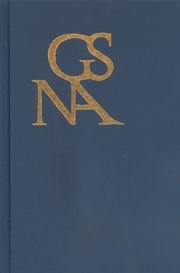Book contents
- Frontmatter
- Contents
- Illustrations
- Special section on childhood edited by Anthony Krupp
- Natural Palingenesis: Childhood, Memory, and Self-Experience in Herder and Jean Paul
- The Promises of Childhood: Autobiography in Goethe and Jean Paul
- The Education of Humankind: Perfectibility and Discipline in Kant's Lectures Über Pädagogik
- Kästchenwahl
- Sentimental Confusion: Art, Nature, and Aesthetic Autonomy in Goethe's Der Triumph der Empfindsamkeit
- Seeing the Light: Goethe's Märchen as Science—Newton's Science as Fairy Tale
- The Ironic “Tick” in Goethe's Egmont:The Potentials and Limits of the Modern Heroic and Poetic Ideal
- The Philosophical Concept of the Daemonic in Goethe's “Mächtiges Überraschen”
- “Die pilgernde Törin”: Genesis, Revaluation, and Mirroring in Goethe's Wanderjahre
- Book Reviews
Natural Palingenesis: Childhood, Memory, and Self-Experience in Herder and Jean Paul
from Special section on childhood edited by Anthony Krupp
Published online by Cambridge University Press: 05 February 2013
- Frontmatter
- Contents
- Illustrations
- Special section on childhood edited by Anthony Krupp
- Natural Palingenesis: Childhood, Memory, and Self-Experience in Herder and Jean Paul
- The Promises of Childhood: Autobiography in Goethe and Jean Paul
- The Education of Humankind: Perfectibility and Discipline in Kant's Lectures Über Pädagogik
- Kästchenwahl
- Sentimental Confusion: Art, Nature, and Aesthetic Autonomy in Goethe's Der Triumph der Empfindsamkeit
- Seeing the Light: Goethe's Märchen as Science—Newton's Science as Fairy Tale
- The Ironic “Tick” in Goethe's Egmont:The Potentials and Limits of the Modern Heroic and Poetic Ideal
- The Philosophical Concept of the Daemonic in Goethe's “Mächtiges Überraschen”
- “Die pilgernde Törin”: Genesis, Revaluation, and Mirroring in Goethe's Wanderjahre
- Book Reviews
Summary
Eighteenth-century discussions of palingenesis present a challenge to intellectual history—an irreducibly “intricate”one, in the words of one scholar attempting to sketch their development from his own early twentieth-century vantage point. The difficulty lies in the concept's inherent variability within Enlightenment and early Romantic discourses. In natural-philosophical and scientific writings, palingenesis indicates a doctrine of rebirth understood as a renewal of bodily material. Yet in the debates about immortality that typically constitute the broader discursive context for palingenetic conceptions at this time, the term is often used synonymously with Christian and non-Christian notions of the rebirth of a non-corporeal substance. Palingenesis is used to mean both a revitalization of physical substance and the flat opposite, the continuity of an immaterial soul that outlives any particular and finite material form. The semantic pliancy is compounded further by how the concept ranges beyond debates about immortality and into other contexts, serving as a proto-evolutionary model of development in natural-historical discussions, as a metaphor of cultural rebirth in historicophilosophical writings, and as a trope of aesthetic production. The history of palingenesis, its career as an idea, in the eighteenth century is shaped largely by how it moves among and is respecified to numerous discursive contexts. Any analysis of “palingenesis” must orient itself in response to this conceptual mobility, following its passages into broader, often overlapping fields of inquiry.
- Type
- Chapter
- Information
- Goethe Yearbook 14 , pp. 1 - 26Publisher: Boydell & BrewerPrint publication year: 2007



